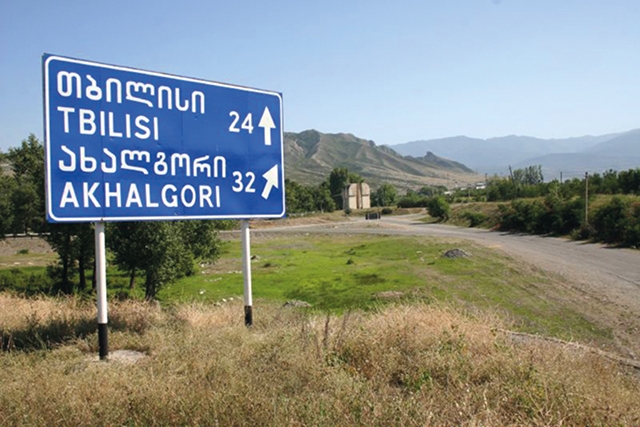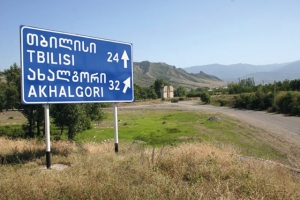Occupied Akhalgori Faces Humanitarian Crisis
Georgia’s Russian-occupied Akhalgori district faces a humanitarian crisis after the de facto regime closed the so called crossing points in early September, leaving around 1500 locals facing restrictions on free movement and a deficit in medicines and food. Even those locals who are in need of serious medical treatment are not allowed to cross the “border” to get medical assistance in Tbilisi.
Everything started on September 5 after Official Tbilisi failed to respond to an ultimatum from the occupant forces to remove a Georgian police checkpoint constructed in late August in Tbilisi-controlled territory near Chorchana village, Khashuri Municipality. In response, the occupant forces opened two new “police posts” in the village and closed checkpoints.
Since the closure of the crossing-points, medicines and products have been brought into Akhalgori from Russia, which are of higher price than most locals can afford.
Akhalgori Governor Nugzar Tinikashvili says the residents of Akhalgori face serious problems due to the closure of the crossing points by the occupants.
“The locals are in a severe social, economic and psychological situation. There are children, students and elderly people who want to live in normal conditions. Occupant forces and separatists say they will not open the crossing point until the Georgian side dismantles the police checkpoint in Chorchana,” Tinikashvili said.
Civic activist Tamar Mearakishvili, who lives in Akhalgori, wrote a post on social media this week which reads that since September, up to 10 people in the area have died due to delayed medical aid or other reasons related to the illegal closure of the crossing points between breakaway Tskhinvali and the rest of Georgia.
She also stressed that the humanitarian situation on the ground is severe and called on the Georgian government to address the European Court of Human Rights to make the de facto authorities open the crossing points.
“Sick patients are unable to attend scheduled chemotherapy due to the closed road. Pensioners whose only income is a Georgian citizen's pension have been without money since August. I do not know how they buy firewood or how they pay for utilities. We demand freedom of movement,” she said.
The Speaker of the Parliament of Georgia, Archil Talakvadze, commented on the humanitarian situation in Akhalgori, and expressed hope that one day the barbed wire fences will be dismantled. According to him, the situation in Akhalgori shows the attitude of the occupation regime and the Russian Federation towards human rights.
“People in Akhalgori need medical care and they are not allowed to go to clinics. People need food, and the occupants do not let in humanitarian aid. People need different state programs, which they cannot enjoy. It seems to me that human rights and humanitarian conditions are deteriorating in both occupied regions of Abkhazia and South Ossetia. The Russian Federation, as an occupation force, cannot show people progress, and our Abkhaz and Ossetian brothers see this very well,” Talakvadze said.
Acting US Ambassador to Georgia Elisabeth Rood urged the Russian-controlled occupation forces to open crossing points between Tskhinvali region and the rest of Georgia.
Rood made a statement on Wednesday, while opening a renovated school in the village of Kveshi at the occupation line.
“The US remains committed to Georgia's territorial integrity and sovereignty. We again urge the de facto authorities to open crossing points on the administrative boundary line and give the local population the opportunity to move freely, receive medical care and live a fear-free life,” she said.
To note, Russia occupied Georgian regions Abkhazia and South Ossetia in the wake of the August 2008 war and since then it has been exercising its power in both regions, stepping up security and building military bases.
By Tea Mariamidze
Image source: humanrights.ge












